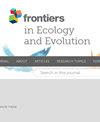A brief global agenda for advancing the study of molluscs
IF 2.4
3区 环境科学与生态学
Q2 ECOLOGY
引用次数: 0
Abstract
Mollusca is the second largest phylum on Earth comprising more than 90,000 species. Molluscs are responsible for key functions and services in aquatic and terrestrial ecosystems. Despite their diversity and ecological and economic importance, several knowledge gaps exist concerning their basic biology. In this mini-review, I succinctly propose a new agenda for the study of molluscs for the next decade dividing it in four major topics that need urgent attention: knowledge shortfalls, monitoring at relevant spatial and temporal scales, conservation, and education and outreach. In this time of climate and biodiversity emergency, the study of molluscs and their conservation should be a priority and we cannot ignore their intrinsic and economic importance.推进软体动物研究的全球简要议程
软体动物是地球上第二大门类,有 90,000 多个物种。软体动物在水生和陆生生态系统中承担着重要的功能和服务。尽管软体动物种类繁多,具有重要的生态和经济意义,但有关其基础生物学的知识仍存在一些空白。在这篇微型综述中,我简明扼要地提出了未来十年软体动物研究的新议程,并将其分为四大亟需关注的主题:知识缺口、相关时空尺度的监测、保护以及教育和宣传。在这个气候和生物多样性紧急的时期,软体动物的研究和保护应成为优先事项,我们不能忽视其内在和经济上的重要性。
本文章由计算机程序翻译,如有差异,请以英文原文为准。
求助全文
约1分钟内获得全文
求助全文
来源期刊

Frontiers in Ecology and Evolution
Environmental Science-Ecology
CiteScore
4.00
自引率
6.70%
发文量
1143
审稿时长
12 weeks
期刊介绍:
Frontiers in Ecology and Evolution publishes rigorously peer-reviewed research across fundamental and applied sciences, to provide ecological and evolutionary insights into our natural and anthropogenic world, and how it should best be managed. Field Chief Editor Mark A. Elgar at the University of Melbourne is supported by an outstanding Editorial Board of international researchers. This multidisciplinary open-access journal is at the forefront of disseminating and communicating scientific knowledge and impactful discoveries to researchers, academics and the public worldwide.
Eminent biologist and theist Theodosius Dobzhansky’s astute observation that “Nothing in biology makes sense except in the light of evolution” has arguably even broader relevance now than when it was first penned in The American Biology Teacher in 1973. One could similarly argue that not much in evolution makes sense without recourse to ecological concepts: understanding diversity — from microbial adaptations to species assemblages — requires insights from both ecological and evolutionary disciplines. Nowadays, technological developments from other fields allow us to address unprecedented ecological and evolutionary questions of astonishing detail, impressive breadth and compelling inference.
The specialty sections of Frontiers in Ecology and Evolution will publish, under a single platform, contemporary, rigorous research, reviews, opinions, and commentaries that cover the spectrum of ecological and evolutionary inquiry, both fundamental and applied. Articles are peer-reviewed according to the Frontiers review guidelines, which evaluate manuscripts on objective editorial criteria. Through this unique, Frontiers platform for open-access publishing and research networking, Frontiers in Ecology and Evolution aims to provide colleagues and the broader community with ecological and evolutionary insights into our natural and anthropogenic world, and how it might best be managed.
 求助内容:
求助内容: 应助结果提醒方式:
应助结果提醒方式:


